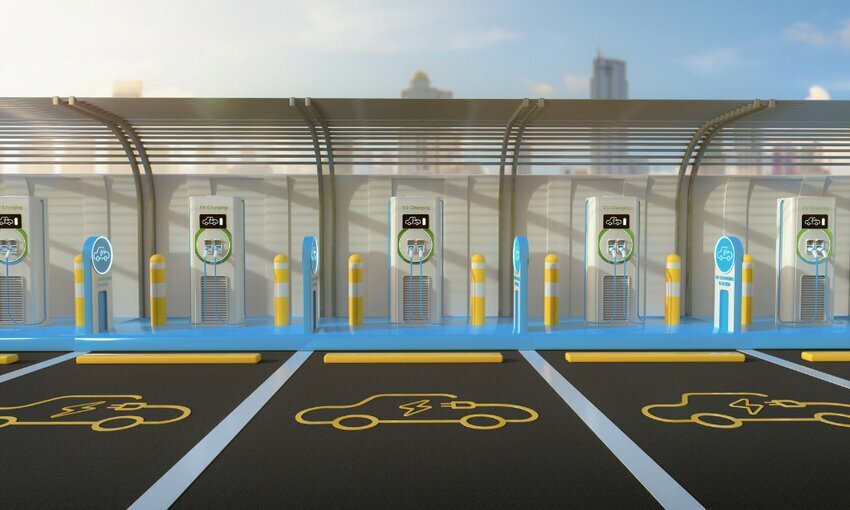 (Credit: Canva Pro)
(Credit: Canva Pro)Companies that are growing their electric vehicle (EV) fleets will need to invest in smart energy management infrastructure and technology in order to reduce carbon emissions, lower utility costs, and maximize their fleets’ capability no matter what outdoor conditions are.
Electric vehicles (EVs) are rapidly gaining popularity, with sales predicted to increase over the next decade and public infrastructure working to meet that demand via charging stations. For companies working toward greener, more sustainable operations, replacing traditional gas-powered vehicle fleets with EVs is an effective way to reduce carbon emissions — but there’s more to building and maintaining a fleet than simply buying the vehicles and installing charging stations. With a smart, sustainable energy management plan, organizations can properly prepare for the EV revolution heading their way.
Companies that adopt EV fleets will need to make a plan to effectively charge vehicles, without spiking their utility costs or drawing too much from the energy grid. It’s likely that states will need to update their energy infrastructure in anticipation of more EVs on the road in the coming years — for example, California will need to triple its power generation capacity. But companies will also need to integrate intelligent solutions in order to strategically charge their fleets with the resources available to them now.
One of the top concerns companies will need to consider is how to make their charging stations and schedule as cost-efficient as possible. There are several ways to accomplish this:
It’s becoming increasingly important for companies to make carbon emission reductions across their operations. Sustainability is quickly emerging as a core component of how businesses report to investors, recruit new hires, and connect with consumers. As companies identify ways to reduce their carbon footprint, they must consider how their vehicle fleets will contribute to it now and in the future.
Adopting EV fleets can be an impactful part of a company’s wider sustainability plan. According to the EPA, EVs typically result in less greenhouse gas emissions, even when accounting for a portion of electricity generated by natural gas or coal. If electricity is generated by renewable sources, EVs produce even fewer emissions. With non-electric vehicles contributing to over a quarter of the U.S.’s carbon emissions, a transition to an EV fleet can make a large difference for companies and the wider environment.
By utilizing EVs and installing the necessary infrastructure for them, businesses are not only making a sustainable choice for their operations but future-proofing them. As we continue to witness the effects of climate change, companies will need to anticipate and prepare for extreme weather events that can halt operations or make it all but impossible to access specific resources. An EV fleet supported by renewable energy and smart technology will be well-equipped to overcome these challenges as they happen.
For example, in Texas and California, we’ve seen how extreme temperatures on either end of the spectrum have threatened to overload, or cut access to, community power grids. While events like these may make it sound like a reason to stay away from EV fleets, it’s actually easier than expected to prepare ahead of time, react to real-time conditions, and continue operating. When extreme cold downs power grids, EV fleets can rely on backup batteries to stay charged. And in extreme heat, if charging stations are connected to a community grid, energy management software can find the most optimal energy usage level that supports continued charging without overstressing the grid, preventing blackouts that are dangerous to workers and the wider community.
There are additional benefits that come alongside the decision to utilize an EV fleet. Reducing the need for fuel cuts costs in the long term, opening room in the budget for a larger fleet or other sustainability projects. Using an EV fleet also prevents potential problems if storms or other events result in fuel shortages, helping to keep vehicles operational in times of crisis.
EV fleets are more than just the next generation of vehicles: they’re a long-anticipated tool to make vehicle transportation more sustainable than it ever has been. By fully building out the infrastructure needed for a fleet — installing renewable energy, smart technology, and battery storage — EV fleets can also provide a higher level of financial and logistical efficiency and security. By building up the infrastructure for EVs now, businesses will be ahead of the curve in reaping the full business benefits of electric fleets.

Joël Désiré, Connected Building Solution Manager, Distech Controls:
Joel is passionate about designing products and services that leverage the latest technologies and support innovative business models to develop differentiating digital offerings.

Gavin Platt, Head of User Experience & Design, Atrius, Acuity Brands
Gavin Platt is a multidisciplinary user experience designer and product leader who collaborates to build elegant, transformative products that make a lasting impact on people and the planet.